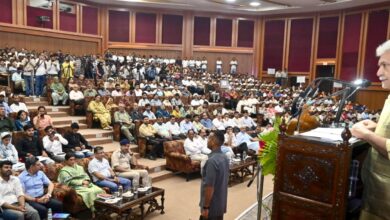J-K High Court grants relief to teacher blamed for student suicide

J-K High Court grants relief to teacher blamed for student suicide
SRINAGAR: High Court of Jammu and Kashmir and Ladakh recently quashed a criminal case against a college teacher who was booked for suicide abetment after a student (deceased) he had reported for an attendance shortage named him in a suicide note.
Justice Rahul Bharti observed that merely because a person who dies by suicide was angry, annoyed or frustrated by the acts of another, it does not mean that all such other persons can be casually booked for suicide abetment under Section 306 of the Indian Penal Code (IPC).
Otherwise, teachers, parents, etc. would constantly be at risk of being booked in such cases, he noted.
“Just because a person committing suicide was angered/ annoyed/ frustrated so on and so forth because of any act of omission or commission of and by another person thereby leading him/her to commit suicide will not, ipso facto, rope in the person with an accusation of commission of section 306 of the Indian Penal Code, 1860 as otherwise the parents, teachers, guides, superiors etc., would, perpetually and potentially, stand exposed, at any given point of time, to the ever lurking apprehension/fear of being charged for commission of section 306 of the Indian Penal Code, 1860 as and when a person subject to their positional influence/authority would opt to end his/her life. Section 306 of the Indian Penal Code, 1860 was not kept in the Indian Penal Code, 1860 with such a casual legislative understanding or perspective,” the August 20 ruling said.
The High Court added that a person could be booked for suicide abetment only if he intentionally drives a person to die by suicide or if he engineers a situation that would drive a person to take such an extreme step.
“Section 306 of the Indian Penal Code, 1860 has a very well defined core and that is a person to be accused of commission of section 306 of the IPC actually intends the bearer/sufferer of the act of omission or commission from his end to end one’s life and to achieve the said end objective the person accused as an abettor, in fact, engineers the circumstances for the person to be a victim to carry out self termination of his/her life,” the Court said, in this regard.
The Court was hearing a plea by Rajnesh Sharma, an assistant professor of political science at Government Degree College (GDC), Kathua who was arrested in 2022 after a student committed suicide and mentioned Sharma in his suicide note as the reason for taking his own life.
The student had been reported for an attendance shortage by Sharma some time before the student’s suicide.
After his arrest, Sharma was also suspended from his position. He was later released on interim bail. He proceeded to challenge the suicide abetment case filed against him before the High Court.
Sharma submitted that he was surprised by his arrest in the matter, and that Kumar was only one of around 90 students who were reported for an attendance shortage.
Sharma argued that he had merely done his duty while reporting the attendance shortage and that he was not personally against any student.
The Court found that there was nothing to indicate that Sharma had actually intended for the student to think of dying by suicide.
“All ninety (90) other students with shortage must have been in some state of frustration, annoyance and exasperation against the petitioner but for that the petitioner could not be blamed,” the Court added.
The Court also noted that the student’s family had not filed the complaint against Sharma. This also showed that the family was unaware of the student’s mental distress prior to his death.
“Just because Sanjay Kumar left a suicide note bearing a reference to the petitioner cannot mean that the petitioner is to be left to suffer self-condemnation for all time,” the Court concluded.
The Court further observed that if Sharma is held liable for suicide abetment in this case, by the same logic, even the police could be charged for the same offence if Sharma were to die by suicide after blaming the police for registering a case against him.
“If the present petitioner, being frustrated by the fact of registration of FIR against him and his consequent suspension from the service and purported disrepute … were to end his life, then would that act of suicide on the part of the petitioner should result in booking of the police, the College administration or for that matter the family of the deceased Sanjay Kumar in alleged commission of offence under Section 306 of IPC? The answer would be a big ‘NO,'” the Court said.–(Bar & Bench)





